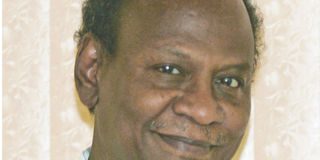Sudanese writer wins the 2017 Caine Prize for African writing

Bushra al-Fadil scores a triple feat to become first Arab and oldest writer win 17-year-old prize. PHOTO| FILE| NATION MEDIA GROUP
What you need to know:
- To give the exact title as he wrote it, Bushra said, he would prefer it to be translated as ‘The Girl Whose Sparrows Flew Away,’ not ‘Birds’ as is the case.
- Bushra says his poetry background is a great asset to his short story writing. “I came to fiction from poetry… which allows poetry to be inserted through images as I write in my mind.”
- The author has five collections of short stories and two novels. His latest collection, Above a City’s Sky, was published in 2012 and won the country’s Al-Tayab Short Story Award.
Sudanese poet, short story writer and novelist Bushra al-Fadil has won the 2017 Caine Price for African Writing award, scoring a tripple first in the 17-year-old prize. Not only is Bushra the first Arab author to win the English-based award for African short stories but he is also the oldest winner of the same.
Bushra, 65, was declared winner on Monday night for his short story, The Story of the Girl Whose Birds Flew Away, that is published in the anthology The Book of Khartoum – A City in Short Fiction.
The story was first written in Arabic in 1979 and translated into English last year by Max Shmookler assisted by Najlaa Osman Eltom. This makes it the oldest story to win an award in the £10,000 (Sh1,350 000) prize.
The author, who lives in exile in Saudi Arabia, will share the cash prize with his translator in portions of £7,000 and £3,000 respectively.
In the story, the prolific poet charmed the judges with his poetic and surrealistic account of sexual harassment and physical abuse of women in Khartoum. Announcing the results in London early this week, the chair of the judging panel, Prof Nii Ayikwi Parkes from Ghana, said the author combined metaphor and unique insight to explore the various aspects and challenges of freedom in the society.
“Rooted in a mix of classical traditions as well as the vernacular contexts of its location, Bushra al-Fadil’s The Story of the Girl Whose Birds Flew Away, is at once a very modern exploration of how, assaulted from all sides and unsupported by those we would turn to for solace, we can became mentally exiled in our own lands, edging in to a fantasy existence where we seek to cling to a sort of freedom until, ultimately, we slip into physical exile,” said Parkes in a statement.
The Story of the Girl Whose Birds Flew Away revolves around two mystery girls in a town and a male narrator fascinated by their sheer beauty and charm amidst the town’s madness and treachery. The town teems with all manner of social vile and vice.
So poetic is the story written that Iquo Diana Abasi says in a review of the story after it was shortlisted that poetry resides in the margins and paragraphs of this story. “This narrator describes the girl with such deep devotion and poetic flourish, one can be forgiven for thinking this is a romance preparing to unfurl. Poetry resides in the margins and paragraphs of this story. Unabashed, metaphors flirt across the page in a dance so vivid and sensuous, it is difficult to ignore.”
Bushra, who holds a PhD in Russian Language and literature, has lived in exile since the early 1990s after he criticised the Sudan government under President Omar El Bashir. By then he was teaching literature at the University of Khartoum. A number of his colleagues and students also went into exile from the repressive regime.
In an interview with wasafiri.org, Bushar says The Story of the Girl Whose Birds Flew Away is his second short story which he wrote in 1979. Then, he says, women in his country “were facing violence, sexual harassment and brutality of all kinds.” He regrets that they are still facing the same maltreatment today.
However, as is the risk of many translated works, a bit of subtlety and semantics may have been lost in the story’s translation from Arabic to English. The author insinuated as much about the title in the interview.
To give the exact title as he wrote it, Bushra said, he would prefer it to be translated as ‘The Girl Whose Sparrows Flew Away,’ not ‘Birds’ as is the case.
Bushra says his poetry background is a great asset to his short story writing. “I came to fiction from poetry… which allows poetry to be inserted through images as I write in my mind.”
The author has five collections of short stories and two novels. His latest collection, Above a City’s Sky, was published in 2012 and won the country’s Al-Tayab Short Story Award.
Currently, he is writing a third novel, a futuristic work set in what might happen to his country in 2084. It follows in the ink trails and 100 years of George Orwell’s horrifying novel, Nineteen Eighty Four.
More information
About the caine literature prize
The Caine Prize for African Writing is a literature prize awarded to an African writer of a short story published in English. The prize was launched in 2000 to encourage and highlight the richness and diversity of African writing by bringing it to a wider audience internationally. The focus on the short story reflects the contemporary development of the African story-telling tradition.
2017 Winner: Bushra al-Fadil (Sudan) for ‘The Story of the Girl Whose Birds Flew Away’
Translated by Max Shmookler
Published in ‘The Book of Khartoum - A City in Short Fiction’
Edited by Raph Cormack & Max Shmookler (Comma Press, UK. 2016)




